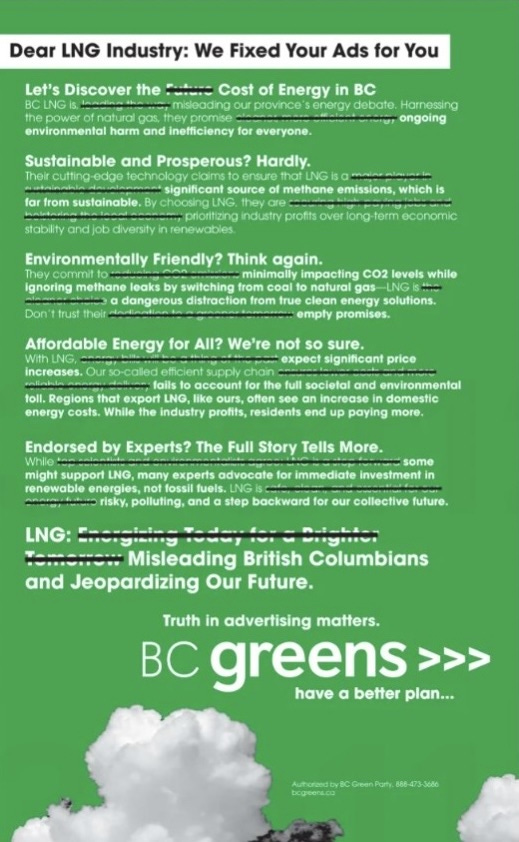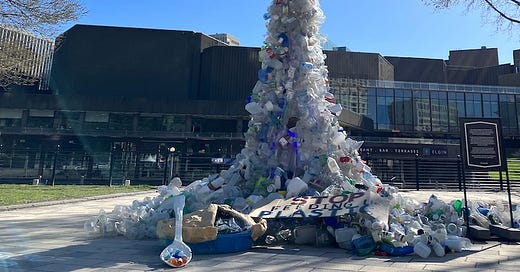This week, The Energy Mix Weekender is passing the mic to Suzanna Schofield, a student at Wellesley College in Massachusetts who was here in Ottawa late last month to attend the Intergovernmental Negotiating Committee on Plastic Pollution (INC-4) meetings as a youth observer.
Immediately after the conference, The Energy Mix reported that the plastics and fossil fuel industries had flooded the negotiations, with nearly 200 lobbyists and executives onsite fighting for the “weak compromise” the conference eventually produced. And they weren’t being subtle: there were complaints of a brand of “petromasculinity” that had lobbyists yelling in the faces of civil society delegates and trying to intimidate scientists and other delegates, especially women.
“For two years, the majority of negotiators have come to the table in good faith, but we are facing an industry that fights dirty,” said Delphine Lévi Alvarès, global petrochemical campaign coordinator at the Center for International Environmental Law.
You would almost think plastic industry execs were aiming for a presence onsite as toxic as the product they represent. And, y’know? It was a heavy lift. It took talent and commitment. But they may just have accomplished that mission.
We’re proud to carry Suzanna Schofield’s account of how she got to the conference, why it was so important to her to attend, what she found when she got to Ottawa, and why she still has hopes for the next round of negotiations, INC-5, in Busan, South Korea later this year.
In spring of 2022, in one of my favourite international environmental law courses at Wellesley College, each student was given an international environmental treaty to research through the semester. International negotiations, non-binding voluntary agreements, and the challenges associated with creating a treaty were all topics that we discussed during the term. On the last day of class, we discussed the Global Plastics Treaty.
Never would I have imagined that only two years later I would be attending the negotiations myself.
But I applied to the Global Youth Coalition on Plastic Pollution (GYCPP), and heard from them in late February. Organizations had opened up a limited number of badges for youth to attend the Intergovernmental Negotiating Committee on Plastic Pollution (INC-4) meetings in Ottawa. On only a couple of hours’ notice, I decided I would miss the last full week of class of my undergraduate career to attend the negotiations.
Not only was this my first United Nations-sponsored event; it was also the first time I had attended international negotiations.
I had a few reasons to apply to attend INC-4. I am the outreach and communications director for a small organization focused on water conservation. Over the years, I have also joined a variety of water conservation organizations and campaigns, including EarthEcho’s GenSea and the Inland Ocean Coalition, and I am a youth advisory council member at The Climate Initiative. At college, I have done a lot of work on waste management, served as the zero waste intern for the college’s Office of Sustainability, and have been president of our environmental action student organization for the past three years. In these roles, we often focus on the impacts of plastic pollution, specifically the environmental justice and health impacts that plastic pollution poses. My own family has experienced a series of chronic health issues, and knowing how plastic and the hazardous chemicals in plastic can exacerbate those issues greatly concerns me.
I arrived at INC-4 on Partnerships Day, the day before negotiations began. Though it was my first UN event, I quickly dove into the opportunities. I volunteered at a couple side events, prepared for bilateral meetings, attended sessions and took notes for the GYCPP, and attended panels and receptions where I could learn more about the plastics industry and plastic pollution.
I was struck by the passion of other youth delegates, and moved by the GYCPP’s advocacy work. Many UN member states do not recognize youth and children as vulnerable populations, nor as focal points for the treaty. As this treaty is negotiating our future, the role of youth in the negotiations is critical. People I met were pushing for the talks to factor in health, nature protection and biodiversity, environmental justice, and a full life cycle approach to plastics, among other issues.
But at a conference where youth had only a limited voice, the plastics industry was fully represented. One of the most striking aspects of the INC-4 was the extent to which member states and fossil fuel lobbyists were pushing for a treaty that was limited to managing plastic waste, rather than mandating a decrease in plastic production.
The INCs began with a UN Environment Assembly resolution titled “End plastic pollution: Towards an international legally binding instrument.” It calls for steps “to promote national and international cooperative measures to reduce plastic pollution in the marine environment, including existing plastic pollution; to develop, implement and update national action plans reflecting country-driven approaches to contribute to the objectives of the instrument; to promote national action plans to work towards the prevention, reduction and elimination of plastic pollution; and to support regional and international cooperation.”
But somehow, those bold objectives seemed to have been sidelined by the time we arrived in Ottawa for INC-4. Rather than focusing the instrument on curbing plastic pollution, member states interpreted the resolution as a call for countries to create a legally binding instrument on effective waste management of plastic pollution.
For youth delegates attending the conference, that was a deal-breaker. If this treaty fails to limit plastic pollution, fossil fuel companies will continue to profit from business as usual, from a plastics life cycle that has them extracting resources, emitting climate pollution, producing (literal) mountains of waste, and harming communities.
We also witnessed efforts to make the treaty voluntary, rather than legally binding, and to dial back the responsibilities of member states. But if this instrument is not legally binding and does not address the root causes of plastic pollution, then truly, what was the point of the whole effort? Though each nation has a different capacity to control plastics, the life cycle of plastics demands a global effort to limit plastic pollution and its effects.
Member states were not the only ones throwing roadblocks in the way of an effective treaty. Lobbyists and advocates for the plastics industry were out in full force, with nearly 200 of them accounting for nearly 10% of the conference participants. One night, I attended a networking reception hosted by the National Association for PET Container Resources called Friends of Zero Waste to discuss polyethylene terephthalate (PET) plastic. There, I talked to several people working in the plastics industry who claimed PET plastic is safe for the environment and people, and easy to recycle. Vice presidents of plastic manufacturing companies urged continuing reliance on plastic, warning that the world could not exist without the presence of plastic.
With a focus on extended producer responsibility and a circular economy, which I was not expecting, manufacturers claimed that the international Scientists’ Coalition for an Effective Plastics Treaty was misguided in its call for real controls on plastic production. They maintained that the human health effects of plastic pollution are not widely understood, and anyone who said differently was “crazy”.
Earlier that same day, I had attended meetings with the Scientists’ Coalition and the Endocrine Society, both of which had described the health impacts of plastic, and I have researched those impacts myself, as have friends and colleagues who are studying the effects of plastic pollution at MIT.
Hearing those reasoned, well-researched positions described as crazy or misguided, I was glad I had the whole story. But I was also astonished at the lobbyists’ willingness to tell youth that plastics do no harm. Out here in the real world, I worry every day about the sheer volume of plastics that my loved ones and I are consuming, and how not even rainwater is safe to drink anymore.
INC-4 ended in a weak compromise. Still, I have hope for INC-5. There are many advocacy groups, including GYCPP, the Indigenous Peoples’ Caucus, the Scientists’ Coalition, and many others, all pushing hard for an effective treaty. I met some incredible people working on the front lines of the plastics crisis, and I know they will not rest until all communities are given the right to a clean, healthy, and sustainable environment, free from the impacts of plastics. I am hopeful regarding the intersessional work to come, and with the progress we made at INC-4.
Mitchell Beer traces his background in renewable energy and energy efficiency back to 1977, in climate change to 1997. Now he and the rest of the Energy Mix team scan 1,200 news headlines a week to pull together The Energy Mix, The Energy Mix Weekender, and our weekly feature digests, Cities & Communities and Heat & Power.
Rewrite of the Week

Lobbyists Win, UN Spins as Plastics Talks Reach ‘Weak Compromise’
‘Silent Killer’: Canadian Cities Scramble to Prevent Heat-Related Deaths
Plastics Industry ‘Fighting for its Life’ as Ottawa Treaty Talks Draw to a Close
Strict New EPA Rules Cap ‘Historic Grand Slam’, Force Coal Plants to Capture Emissions or Shut Down
Drought Fuels Wildfire Concerns as Canada Braces for Another Intense Summer
EU Exits Treaty Allowing Fossils to Sue Over Climate Policy
Ottawa to Force Banks to Name the Carbon Rebate on Direct Deposit Statements
‘Reconductoring’ Could Boost Grid Capacity at a Fraction the Cost of New Power Lines
Violent attacks against environmental journalists on the rise, report finds (The Guardian)
Planned anti-carbon price protests prompt security warning to MPs (Global News)
So you bought a pipeline. Now what? (Globe and Mail)
‘Too little, too late’ as G7 agrees to end coal-fired power plants by 2035 (The Independent)
EU investigates ‘greenwashing’ at 20 airlines (Financial Times)
Aramco Signs FIFA Deal (Rigzone)
African leaders seek record World Bank financing to combat climate change (Reuters)
Climate change may be largest threat to caribou herds, study says (CBC News)
New green bank to support distributed solar and storage in the Appalachian region (PV Magazine)
The ‘valley of death’ for climate tech lies between early-stage funding and scaling up (TechCrunch)
Southern Africa drought flags dilemma for loss and damage fund (Climate Home News)
Scotland's leader resigns after conflicts over climate change, gender identity weakened government (The Associated Press)








Such a good point, Carolyn, thanks. When I think of the huge, years-long effort (and unsuccessful so far) that has gone into kicking fossil fuel lobbyists out of the climate COPs, I worry that the INC- series won't go long enough to even get that conversation started...unless they get a treaty in South Korea and decide to keep meeting, at which point the incrementalism and the industry politics will be just beginning.
I hope that the lobbyists for the fossil and chemical industries will be barred from attending the next INC-5 and the next COP. This comment was distressing to read “ But at a conference where youth had only a limited voice, the plastics industry was fully represented. One of the most striking aspects of the INC-4 was the extent to which member states and fossil fuel lobbyists were pushing for a treaty that was limited to managing plastic waste, rather than mandating a decrease in plastic production”.